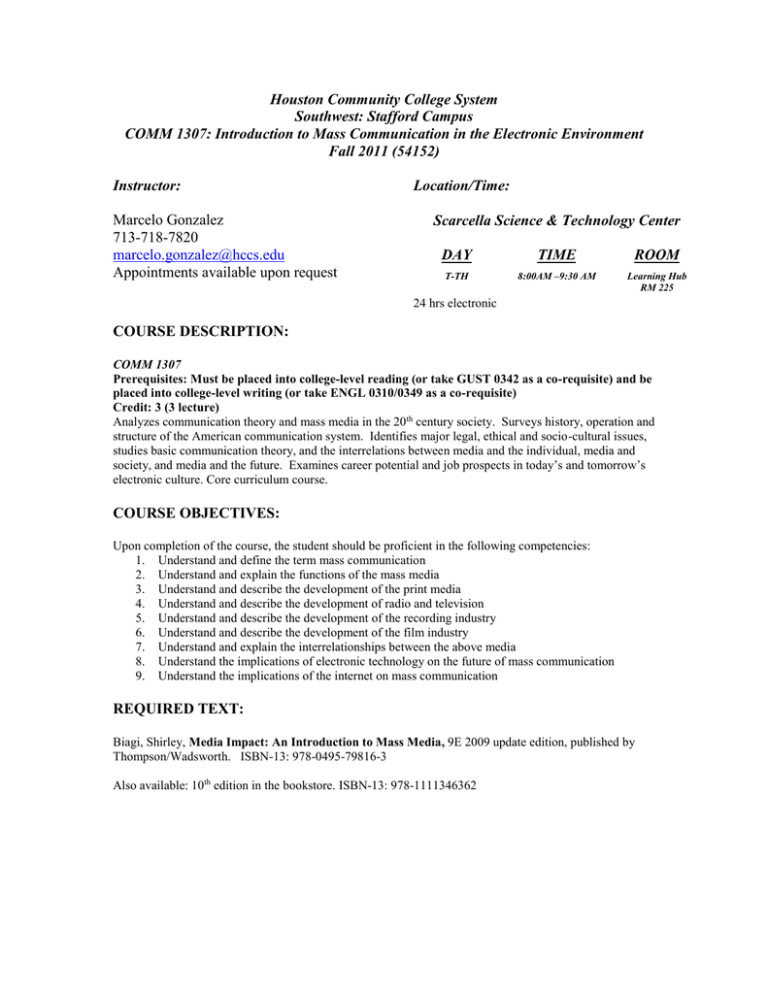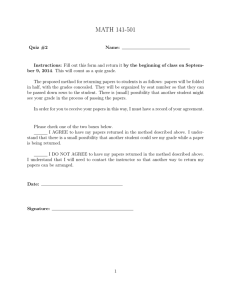Syllabus_6121 8wk1.doc
advertisement

Houston Community College System Southwest: Stafford Campus COMM 1307: Introduction to Mass Communication in the Electronic Environment Fall 2011 (54152) Instructor: Marcelo Gonzalez 713-718-7820 marcelo.gonzalez@hccs.edu Appointments available upon request Location/Time: Scarcella Science & Technology Center DAY TIME ROOM T-TH 8:00AM –9:30 AM Learning Hub RM 225 24 hrs electronic COURSE DESCRIPTION: COMM 1307 Prerequisites: Must be placed into college-level reading (or take GUST 0342 as a co-requisite) and be placed into college-level writing (or take ENGL 0310/0349 as a co-requisite) Credit: 3 (3 lecture) Analyzes communication theory and mass media in the 20th century society. Surveys history, operation and structure of the American communication system. Identifies major legal, ethical and socio-cultural issues, studies basic communication theory, and the interrelations between media and the individual, media and society, and media and the future. Examines career potential and job prospects in today’s and tomorrow’s electronic culture. Core curriculum course. COURSE OBJECTIVES: Upon completion of the course, the student should be proficient in the following competencies: 1. Understand and define the term mass communication 2. Understand and explain the functions of the mass media 3. Understand and describe the development of the print media 4. Understand and describe the development of radio and television 5. Understand and describe the development of the recording industry 6. Understand and describe the development of the film industry 7. Understand and explain the interrelationships between the above media 8. Understand the implications of electronic technology on the future of mass communication 9. Understand the implications of the internet on mass communication REQUIRED TEXT: Biagi, Shirley, Media Impact: An Introduction to Mass Media, 9E 2009 update edition, published by Thompson/Wadsworth. ISBN-13: 978-0495-79816-3 Also available: 10th edition in the bookstore. ISBN-13: 978-1111346362 COURSE REQUIREMENTS: Attend all class lectures. Take 15 quizzes online and successfully pass 12 of them. GRADING POLICY: Quizzes (12 of 15) Participation and Attendance 85 points 15 points TOTAL 100 points Grading scale according to HCCS Student Handbook: 90-100 80-89 70-79 60-69 0-59 A B C D F ATTENDANCE/TARDINESS POLICY: Students are required to attend every class day and be present by the start of class. During the 16-week semester, HCCS allows for a total of 3 classes missed per semester; after that, the instructor may drop you from the course. Also, attendance and participation is 15% of your final grade. Every absence after 1 is counted against this portion of your grade. A student must be in class within the first 20 minutes of class to be considered “on time”. This 20 minutes is the time we use to take the daily quiz, on most days. After 20 minutes, a student is considered “tardy”, and this will result in a ½ absence. Also please note: since quizzes are given daily during the first 20 minutes of class, every minute you are late to class will mean one minute less you have to take that quiz. Being late or absent has multiple penalties. Attendance is taken daily. BLACKBOARD VISTA: This is a hybrid course, which means 50% of the course content is available online on Blackboard Vista. This will include video lectures for chapters 2-9 of the Media/Impact textbook. These chapters cover the eight mass media that make up mass communication in the modern world. You are required to watch the lectures and read the corresponding text chapters. QUIZZES AND MAKE-UPS: The majority of your grade is calculated from your quiz grades: 85% of your final grade. All 15 quizzes are available ONLINE on your student account at hccs.blackboard.com. These quizzes cover both the classroom and online portions of the course. You will only have one attempt of 11 minutes to take each quiz. There are no quiz make-ups. Because of this, the instructor will drop the three lowest quiz scores of the semester when calculating the final grade. It is strongly advised you be available for the entire quiz attempt and be on a secure online connection before attempting any one quiz. Your 3 lowest quiz grades will be dropped; this includes and quizzes you receive a “0” on due to missing the quiz. COURTESY: In a polite society, and there is much that can be debated over just what constitutes a “polite” society today, there are certain rules of conduct in place so that people can show respect to one another. The instructor has three particular rules for this class. LEAVING THE CLASS: If, for whatever reason, a student needs to leave the classroom during instruction, they must ask permission of the instructor. The instructor 99% of the time will allow the student to leave. The student does not need to give any explanation to the instructor nor will the instructor require any explanation. CELL PHONES: All cell phones must be turned off during class. No exceptions. On rare occasion where it is absolutely imperative that the student be reachable by cell phone during class, such occasion must first be cleared with the instructor. If you need to make a call during class, please wait for the break. DISRUPTIVE BEHAVIOR: Students and instructor are expected to conduct themselves in class professionally and with good manners. Behavior which disrupts instruction of the class will not be tolerated. This includes behavior such as, but not limited to arguing fighting, intimidating, and talking out of turn. Violation of the above rules could lead to penalty of the participation portion of your grade and/or class expulsion. COURSE OUTLINE: Meeting Week Day Activity Blackboard Vista Week 1 08/30 09/01 09/06 Introduction Chapter 1: Mass Media Intro Chapter 10: Advertizing: Motivating Customers Chapter 2: Books: Rearranging the Page Chapter 3: Newspapers: Expanding Delivery Week 2 09/08 Week 3 09/13 Week 4 09/15 09/20 Week 5 09/22 09/27 09/29 Week 6 Week 7 Week 8 10/04 10/06 10/11 10/13 10/18 10/20 Chapter 4: Magazines: Targeting the Audience Chapter 11: Public Relations: Promoting Ideas Chapter 5: Recordings: Demanding Choices Chapter 12: News and Information: Getting Personal Chapter 6: Radio: Riding the Wave Chapter 13: Society, Culture, and Politics: Shaping the Issues LAST DAY WITHDRAWL Friday September 30 2011 -- 4:30PM Chapter 14: Law and Regulation Chapter 7: Movies: Picturing the Future Chapter 8: Television: Changing Channels Chapter 14: continued Chapter 9: Digital Media: Widening the Web Chapter 15: Ethics: Placing Responsibility Last Day of Class DISCIPLINE REASONABLE ACCOMMODATION: Any student with a documented disability (e.g. physical, learning, psychiatric, vision, hearing, etc.) who needs to arrange reasonable accommodations must contact the Disability Services Office at Southwest College at the beginning of each semester. Faculty are authorized to provide only the accommodations requested by the Disability Support Services Office. If you have a disability that qualifies you under the ADA (Americans with Disabilities Act), please contact Dr. Becky Hauri, 713-718-7909 to determine accommodations. SCHOLASTIC DISHONESTY Students are responsible for conducting themselves with honor and integrity in fulfilling course requirements. Penalties and/or disciplinary proceedings may be initiated by College System officials against a student accused of scholastic dishonesty. “Scholastic dishonesty” includes, but is not limited to, cheating on a test, plagiarism, and collusion. - “CHEATING” on a test includes: Copying from another student test paper; Using material during a test that are not authorized by the person giving the test; Collaborating with another student during a test without authority; Knowingly using, buying, selling, stealing, transporting, or soliciting in whole or part the contents of an unadministered test; Bribing another person to obtain a test that is to be administered. “PLAGIARISM”- means the appropriation of another’s work and the unacknowledged incorporation of that work in one’s written work offered for credit. “COLLUSION”- means the unauthorized collaboration with another person in preparing written work offered for credit. VIOLATIONS Possible punishments for academic dishonesty may include a grade of “0” or “F” on the particular assignment, failure in the course, and/or recommendation for suspension or expulsion will be referred to the College Dean of Students for disciplinary disposition. Students who wish to appeal a grade penalty should notify the instructional supervisor within 30 working days of the incident. A standing committee appointed by the College Dean of Instruction will convene to sustain, reduce, or reverse the grade penalty. The committee will be composed of two students, two faculty members, and one instructional administrator. A majority vote will decide the grade appeal and its final.

